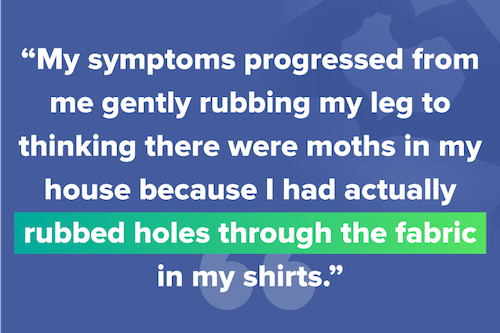Facing Tardive Dyskinesia
by Raven C

I never imagined that what started off as a subtle, gentle rubbing of my right thumb on my right leg (that I barely even noticed) would eventually morph into a monster. My movements were so severe, total strangers would come up in public and ask if I was on heroin or crack. Meanwhile, I was completely unaware of the incessant, involuntary movements my body was making.
My neck would roll and nod uncontrollably. My jaw jutted unceasingly from side to side. My arms and trunk were in constant motion. I had no idea what was causing so many people to come to such a conclusion because I was unaware of what was going on with my body. I couldn’t understand how or why anyone would think such a thing about someone like me. And it was humiliating.
Tardive Dyskinesia (TD), a side effect of antipsychotic medications, is a stealthy condition. The patient, in this case me, is often unaware of their body making the movements. My symptoms progressed from me gently rubbing my leg to thinking there were moths in my house because I had actually rubbed holes through the fabric in my shirts. I rubbed bruises into my arms. The tremors in my hands and fingers became so severe, I could not button my shirts or feed myself with a knife and fork. I had to stop working and go on disability. Yet, I still had no idea what was wrong.
I was often paranoid when I went out in public. I couldn’t understand why people would look and stare at me. Eventually I just stopped going out. I isolated myself so that I wouldn’t have to deal with the paranoia and face potential humiliation.
Getting diagnosed with TD was a watershed moment for me. It brought the involuntary movements I was making to my conscious awareness. It provided an explanation for the way people perceived me. Learning that there was a name for what was happening with my body let me know I wasn’t losing my mind.